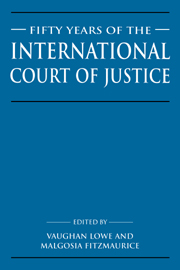Book contents
- Frontmatter
- Contents
- List of contributors
- Preface
- List of abbreviations
- Sir Robert Yewdall Jennings, by Vaughan Lowe
- List of publications of Sir Robert Jennings
- Table of cases
- Part I The International Court of Justice
- Part II The sources and evidences of international law
- 4 The International Court of Justice and the sources of international law
- 5 Municipal law reasoning in international law
- 6 Estoppel and acquiescence
- 7 L'Equité dans la jurisprudence de la Cour Internationale de Justice
- 8 The International Court of Justice and the law of treaties
- 9 International ‘soft law’: a contemporary assessment
- Part III Substance of international law
- Part IV Procedural aspects of the work of the International Court of Justice
- Part V The International Court of Justice and the United Nations
- Index
9 - International ‘soft law’: a contemporary assessment
Published online by Cambridge University Press: 02 November 2009
- Frontmatter
- Contents
- List of contributors
- Preface
- List of abbreviations
- Sir Robert Yewdall Jennings, by Vaughan Lowe
- List of publications of Sir Robert Jennings
- Table of cases
- Part I The International Court of Justice
- Part II The sources and evidences of international law
- 4 The International Court of Justice and the sources of international law
- 5 Municipal law reasoning in international law
- 6 Estoppel and acquiescence
- 7 L'Equité dans la jurisprudence de la Cour Internationale de Justice
- 8 The International Court of Justice and the law of treaties
- 9 International ‘soft law’: a contemporary assessment
- Part III Substance of international law
- Part IV Procedural aspects of the work of the International Court of Justice
- Part V The International Court of Justice and the United Nations
- Index
Summary
WHY REVISIT SOFT LAW?
It is a distinct privilege – in the original sense of something ‘given’ rather than of a personal entitlement – to join such a distinguished company of scholars in paying tribute to Sir Robert Jennings. The sense of genuine pride that this causes me is accompanied, however, by the slight apprehension I feel with regard to the subject of my contribution: soft law.
This for several reasons. The first is the suspicion that the very expression ‘soft law’ may appear to be an oxymoron, a contradiction between the term ‘soft’ and the idea of law as a system of binding enforceable rules. This figure of speech could prove to be an unsuitable subject for honouring Sir Robert, since his scholarship and jurisprudence have never lost sight of the fundamental distinction between legal norms and aspirational goals.
The second reason relates to the lack of a rigorous and generally accepted definition of the term ‘soft law’, which makes it quite unclear how to define the perimeter of our subject. In legal literature, ‘soft law means different things to different people’, a relativism that leaves it unclear whether one should apply the concept only to written law or also to unwritten norms, to softness deriving from the formal status of the prescription and/or also to softness relating to the normative content of an otherwise obligatory prescription. Obviously, I cannot within the limits of this chapter examine in detail all the possible components of a general definition.
- Type
- Chapter
- Information
- Fifty Years of the International Court of JusticeEssays in Honour of Sir Robert Jennings, pp. 167 - 178Publisher: Cambridge University PressPrint publication year: 1996
- 5
- Cited by



